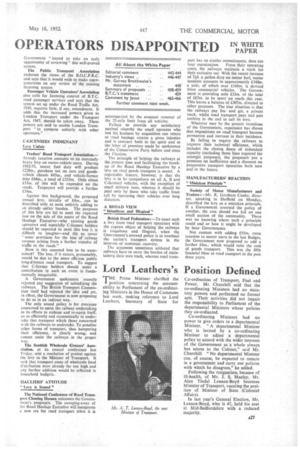OPERATORS DISAPPOINTED 'NpATNE
Page 29

If you've noticed an error in this article please click here to report it so we can fix it.
Government "intend to take an early opportunity of reviewing" this well-proved System.
The Public Transport Association endorses the views of the B.O.C.P.R.C. and says that it would wish to make representations on any review of the existing licensing system.
Passenger Vehicle Operators' Association also calls for licensing control of B.T.C. road passenger services and says that the system set up under the Road Traffic Act, 1930, requires little, if any, amendment. It adds that the increased powers given to London Transport under the Transport Act, 1947, should be taken away. These powers are said to enable London Transport "to compete unfairly with other operators."
C-LICENSEES INDIGNANT Levy Unfair
Traders' Road Transport Association.— Already taxation amounts to an extremely heavy levy on motor-vehicle users. During 1952-53, motor fuel duty will produce £228m., purchase tax on cars and goodsvehicle chassis £43m., and vehicle-licence duty £64m., a total of £335m. Only about £33m, of this will be expended on the roads. Taxpayers will provide a further £34m.
Against this background, the proposed annual levy, initially of £4m., can be described only as most unfairly adding to an already unfair burden. The purposes of this levy are (a) to meet the expected loss on the kale of the assets of the Road Haulage Executive—why existing goods operators and especially C-licence holders should be expected to meet this loss it is difficult to imagine—and (b) to cover some provision for the loss of railway revenue arising from a further transfer of traffic to the roads.” How is this assumed loss to be ascertained? The loss, if it occurs, presumably, would be due to the more efficient public long-distance road transport. To suggest that C-licence holders should make a contribution in such an event is fundamentally. inequitable.
A Government spokesman recently rejected any suggestion of subsidizing the railways. The British Transport Commission itself had rejected the idea and yet, in effect, the Government is now proposing to do so in an indirect way.
The only sound policy is for everyone concerned to assist the railway undertaking in its efforts to reshape and re-equip itself, so as efficiently and economically to undertake that transport which those concerned wish the railways to undertake. To penalize other forms of transport, thus hampering their efficiency, is clearly wrong, and cannot assist the railways in the proper way.
The Scottish Wholesale Grocers' Association, at its annual conference last Friday, sent a resolution of protest against the levy to the Minister of Transport. It said that transport costs of wholesale food distribution were already far too high and any further addition would be reflected in household budgets.
HAULIERS' ATTITUDE "Levy is Sound"
The National Conference of Road Transport Clearing Houses welcomes the Government's proposals. The sweeping-away of the Road Haulage Executive will inaugurate a new era for road transport when it is
accompanied by the eventual removal of the 25-mile limit from all vehicles.
Failure to provide any satisfactory method whereby the small operator who lost his business by acquisition can return to road haulage creates a gross injustice and is contrary both to the spirit and to the letter of promises made by spokesmen of the Conservative Party before and since the Election.
The principle of helping the railways at the present time and facilitating the breakup of the Road Haulage Executive by a levy on road goods transport is sound. A regrettable feature, however, is that the levy is to be compulsory on all A, B and C-licensed vehicles, with the exception of small delivery vans, whereas it should be paid only by those who take traffic from rail by operating their vehicles over long distances. port has no similar commitments, does not bear examination. From their operating costs, the railways maintain a track for their exclusive use. With the recent increase of 71{1. a gallon duty Ofl.motor fuel, motor taxation amounts to approximately £340m. a year, of which over £160m, is derived from commercial vehicles. The Government is providing only £33m. of the total of £67m. to be spent on roads this year. This leaves a balance of £307m. diverted to other purposes. The true situation is that the railways pay for. and get, a private track, whilst road transport pays and gets nothing in the end to call its own.
Whatever may be the present intentions of the Government, experience has shown that impositions on road transport become permanent and increase in their incidence.
By failing to require the railways to improve their technical efficiency, which includes the closing down of redundant capacity (excluding those lines required for strategic purposes), the proposals put a premium on inefficiency and a discount on progressive transport operation both now and in the future.




















































































